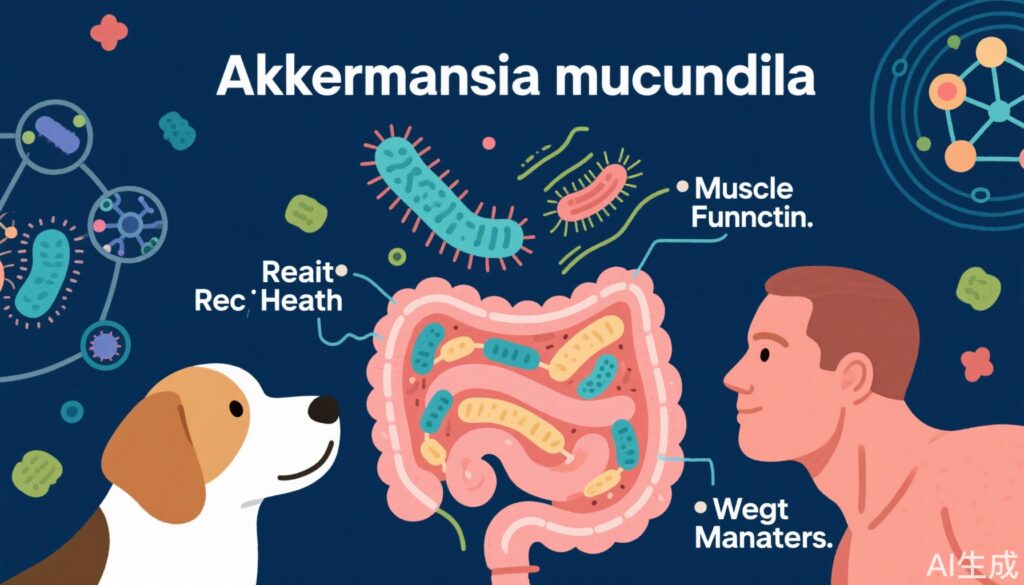Introduction
Akkermansia muciniphila, a beneficial gut bacterium, has recently emerged as a promising agent in managing various health conditions beyond the gut. This article synthesizes findings from three pivotal clinical trials exploring the efficacy of heat-killed and pasteurized A. muciniphila strains in respiratory symptom relief, muscle strength improvement in elderly adults, and obesity management in dogs. These studies underscore the therapeutic versatility of A. muciniphila-derived postbiotics and their potential integration into clinical practice and dietary supplementation.
Study 1: ETB-F01 for Respiratory Symptom Alleviation
Respiratory symptoms like breathlessness, cough, and sputum production are common and often signal declining lung function and increased mortality risk. The gut-lung axis suggests that intestinal microbiota imbalances might influence lung health. In a multicenter, randomized, double-blind clinical trial, ETB-F01—a formulation containing heat-killed A. muciniphila strain EB-AMDK19—was tested against placebo in patients with respiratory symptoms persisting 4 to 12 weeks.
The primary endpoint was the improvement in the Breathlessness, Cough, and Sputum Scale (BCSS) over 12 weeks. Secondary measures included lung function tests, fractional exhaled nitric oxide (FeNO), the modified Medical Research Council dyspnea scale (mMRC), St. George’s Respiratory Questionnaire (SGRQ), and Visual Analog Scale (VAS) scores.
Results showed ETB-F01 significantly improved total BCSS scores compared to placebo, notably reducing breathlessness and cough symptoms. Although lung function showed positive trends, these were not statistically significant. No significant changes occurred in FeNO or other symptom scores. Importantly, ETB-F01 was safe with no serious adverse events reported.
These findings highlight ETB-F01 as a safe and effective therapeutic candidate for respiratory symptom management, potentially through modulation of the gut-lung axis.
Study 2: HB05P Enhances Muscle Strength in Elderly Adults
Sarcopenia, characterized by age-related muscle loss and weakness, severely impacts elderly populations. Prior animal studies indicated that pasteurized A. muciniphila HB05 (HB05P), derived from human breast milk, could counteract muscle wasting. A subsequent 12-week randomized, double-blind, placebo-controlled trial recruited 100 participants aged 60 and above to assess HB05P’s effects on muscle strength and function.
Participants received either HB05P at 1.0 × 10¹⁰ cells per day or placebo. The HB05P group exhibited significant improvements in peak torque and peak torque relative to body weight of the left leg extensor muscles. Additionally, HB05P supplementation elevated follistatin levels, a protein that inhibits myostatin, a negative regulator of muscle growth. No safety concerns were identified.
These results suggest HB05P is a promising postbiotic supplement for enhancing muscle health and function in aging adults, potentially offering a novel approach to sarcopenia management.
Study 3: Heat-Killed A. muciniphila EB-AMDK19 Counters Diet-Induced Overweight in Dogs
Obesity in dogs is a growing health concern linked to chronic inflammatory and metabolic diseases. While A. muciniphila has shown anti-obesity effects in humans and mice, its effects in canines were uncharted. Researchers investigated heat-killed A. muciniphila strain EB-AMDK19 (AMDK19-HK), derived from a healthy Korean donor, in beagles fed a high-fat diet for 12 weeks.
AMDK19-HK supplementation significantly suppressed increases in body weight, fat mass, and serum triglycerides without altering overall hematological or biochemical parameters, indicating a direct anti-obesity effect. Analysis of fecal microbiota revealed increased Firmicutes and decreased Bacteroidota abundances, suggesting AMDK19-HK modulates gut microbiota composition favorably.
This study supports AMDK19-HK as a dietary supplement to combat diet-induced overweight in dogs, offering a novel strategy for veterinary obesity management.
Discussion and Clinical Implications
Collectively, these studies demonstrate the expanding therapeutic potential of Akkermansia muciniphila-based postbiotics. ETB-F01 offers a new avenue for managing respiratory symptoms through gut-lung axis modulation. HB05P presents a safe, effective intervention for muscle strength preservation in elderly individuals, addressing sarcopenia’s challenges. Meanwhile, AMDK19-HK’s anti-obesity effects in canines open possibilities for cross-species applications in metabolic health.
The underlying mechanisms may include modulation of host immune responses, enhancement of gut barrier integrity, and favorable shifts in gut microbial communities, which require further exploration. Safety profiles across studies were favorable, supporting the clinical translation of these postbiotic agents.
Conclusion
Akkermansia muciniphila-derived postbiotics represent a promising frontier in managing respiratory conditions, muscle degeneration, and obesity. Continued research and larger clinical trials will be essential to validate efficacy, optimize dosing, and broaden applications. Integrating these postbiotics into therapeutic regimens and dietary supplements could significantly benefit human and animal health, harnessing the gut microbiome’s power for systemic wellness.
References
Lee HW, Lee SN, Seo JG, et al. Efficacy of ETB-F01, Heat-Killed Akkermansia muciniphila Strain EB-AMDK19, in Patients with Respiratory Symptoms: A Multicenter Clinical Trial. Nutrients. 2024;16(23):4113.
Kang CH, Jung ES, Jung SJ, et al. Pasteurized Akkermansia muciniphila HB05 (HB05P) Improves Muscle Strength and Function: A 12-Week, Randomized, Double-Blind, Placebo-Controlled Clinical Trial. Nutrients. 2024;16(23):4037.
Hong MG, Lee Y, Chung WS, et al. Supplementation with heat-killed Akkermansia muciniphila EB-AMDK19 counteracts diet-induced overweight in beagles. Arch Anim Nutr. 2024;78(3):254-272.



